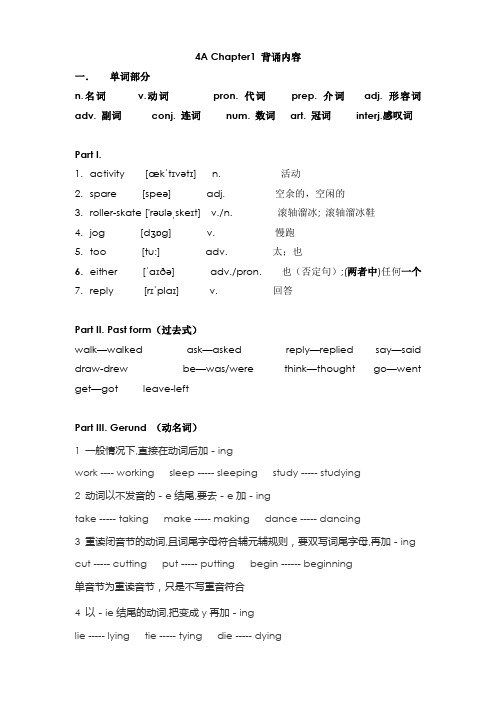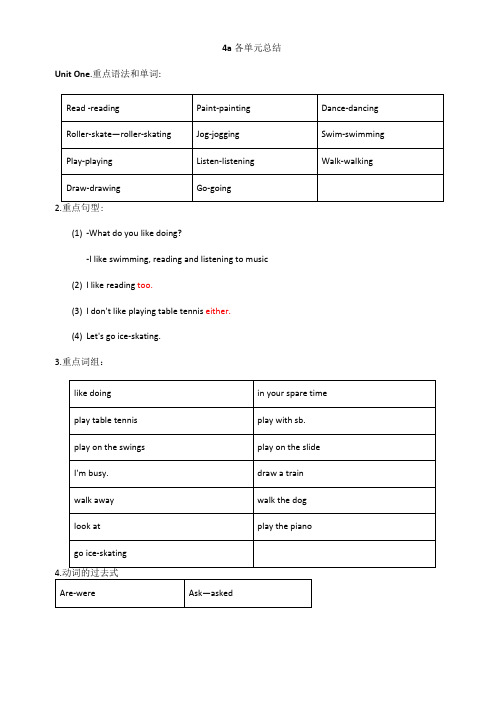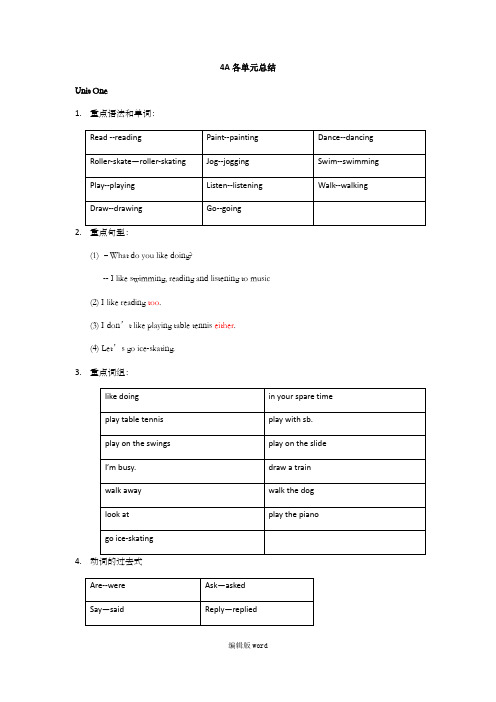香港朗文WTE 4A第二单元 词汇语法 知识点
香港朗文4a各单元总结汇编

4a各单元总结Unit One1.重点语法和单词:2.重点句型:(1) –What do you like doing?-- I like swimming, reading and listening to music(2) I like reading too.(3) I don’t like playing table tennis either.(4) Let’s go ice-skating.3.重点词组:4.动词的过去式Unit two1.重点语法和单词:2.重点句型:(1)--Do you ever tidy your room?-- Yes, I usually tidy my room.(2)—Does she ever play the violin?-- No, she never plays the violin.-- No, she doesn’t play the violin.3.重点词组:4.动词的过去式Unit Three1.重点语法:2.重点单词和词组:3.重点句型:(1)--Was there any cola when you were young?-Yes, there was.(2)The game I like best was marbles.(3)How do you play marbles?(4)– Did you wear trainers fifty years ago?--Yes, I did.(5)—Did you have a telephone?-- No, I didn’t. Rich people had telephones at home but poor people didn’t. (6 ) – Did you shop at the supermarket?--- No, I didn’t. There weren’t any supermarkets.(7) – Did you go to school?-- No, I didn’t. Rich children go to school but poor children didn’t.(8) –Did you listen to the radio?-- Yes, I did.Where(哪里)do you like going to in your holiday?How(如何)do you help at home?How much (多少钱,提问不可数名词)is it? --- It is five dollars. How many (多少,提问可数名词)books in your home?What time(什么时间)is it?What(什么)are you doing now? ----I am doing my homework. What(什么)is the weather like today? ----It’s windy.What color (什么颜色)is it? ---- It is red.What (什么)are you? ( What do you do?) -----I am a driver.When(什么时候)is your birthday? ---on 2nd MayHow old(多大)are you? ----I am ten.Who (谁) are you? -----I am David.Which(哪一个) club do you want to join?Why(为什么)do you like playing football?----Because I like being healthy.。
最新香港朗文4A各单元知识要点 词汇语法

4A Chapter1 背诵内容一.单词部分n.名词v.动词pron. 代词prep. 介词adj. 形容词adv. 副词conj. 连词num. 数词art. 冠词interj.感叹词Part I.1.activity [ækˈtɪvətɪ] n. 活动2.spare [speə] adj. 空余的,空闲的3.roller-skate ['rəʊləˌskeɪt] v./n. 滚轴溜冰; 滚轴溜冰鞋4.jog [dʒɒg] v. 慢跑5.too [tu:] adv. 太;也6.either [ˈaɪðə] adv./pron. 也(否定句);(两者中)任何一个7.reply [rɪˈplaɪ] v. 回答Part II. Past form(过去式)walk—walked ask—asked reply—replied say—said draw-drew be—was/were think—thought go—went get—got leave-leftPart III. Gerund (动名词)1 一般情况下,直接在动词后加-ingwork ---- working sleep ----- sleeping study ----- studying2 动词以不发音的-e结尾,要去-e加-ingtake ----- taking make ----- making dance ----- dancing3 重读闭音节的动词,且词尾字母符合辅元辅规则,要双写词尾字母,再加-ing cut ----- cutting put ----- putting begin ------ beginning单音节为重读音节,只是不写重音符合4 以-ie结尾的动词,把变成y再加-inglie ----- lying tie ----- tying die ----- dying二.词组部分1.i n one’s spare time在某人的空余时间2.listen to (the) music 听音乐3.play chess 下棋4.like/love/enjoy doing 喜欢干某事5.go swimming (去)游泳6.go jogging (去)慢跑7.go roller-skating (去)溜冰8.be good at sth./doing 擅长于某事/干某事9.be poor at sth./doing 不擅长于某事/干某事10.be interested in sth./doing 对干某事/干某事感兴趣11.be afraid of sth./doing 害怕某事/干某事12.at/on the weekend 在周末at/on weekends13.on weekdays 在工作日14.be busy with sth. 忙于某事15.be busy doing 忙于干某事16.enjoy oneself= have a good time 某人玩得很开心17.a family helper 一位家庭帮手18.pick up kids 接小孩19.play the piano/violin 弹钢琴,拉小提琴(西洋乐器名词前加the )20.play Erhu 拉二胡(民族乐器前无the)21.play table tennis 打羽毛球(球类名词前无the)22.play on the swing/slide 在秋千(滑滑梯)上玩23.play with sb. 与某人一起玩24.play with sth. 玩耍某物25.a bit later 一会儿以后26.walk away sadly 难过地走开了27.walk the dog 溜狗28.walk home=go home on foot 走回家29.go home =go back home 回家30.after that 在那以后31.the black notes (钢琴上)黑键32.see sb. doing 看到某人在干某事33.make a new friend named Tom 交了一个叫汤姆的朋友34.in fact = actually/ˈæktʃʊəlɪ/事实上35.in the gym 在体育馆36.indoor stadium /'steɪdɪəm/ 室内体育馆37.finish sth./doing sth. 完成某事/干某事38.be important to sb. 对某人而言是重要的(绿色字体部分为拓展内容,供学有余力的小朋友默写。
最新香港朗文4A各单元知识要点词汇语法

最新香港朗文4A各单元知识要点词汇语法以下是最新版香港朗文4A各单元的词汇和语法要点:Unit 1: Going Places- 词汇:transportation(交通工具),destination(目的地),navigate(导航),explore(探索)- 语法:一般现在时,there is / there are句型,情态动词can的用法Unit 2: Nature's Forces- 词汇:natural disasters(自然灾害),flood(洪水),earthquake(地震),hurricane(飓风),volcano(火山)- 语法:一般过去时,情态动词must / mustn't的用法Unit 3: Materials and Properties- 词汇:materials(材料),properties(特性),solid(固体),liquid(液体),gas(气体)- 语法:现在进行时,情态动词should / shouldn't的用法Unit 4: Diverse Cultures- 词汇:diverse(多样化的),culture(文化),tradition(传统),custom(风俗),celebration(庆祝活动)- 语法:现在完成时,情态动词could / couldn't的用法Unit 5: The Arts- 词汇:artistic(艺术的),creative(创造性的),performance(表演),sculpture(雕塑),painting(绘画)-语法:一般将来时- 语法:过去进行时,情态动词may / must的用法以上是最新香港朗文4A各单元的词汇和语法要点。
请注意,这些要点可能会因版本差异而有所变化,建议参考最新教材或教师的指导。
香港朗文版4A-Chapter2 part A

Yes, No,
he she
surfs the Net. eats out. goes to bed late.
Practice
Sunday Monday Tuesday Wednesday Thursday Friday Saturday
Do you ever go swimming? Yes, I always go swimming.
Now listen carefully. After listening answer my question:
What is Peter good at? How do they know their friends better?
Questions:
1. Do you think Bill is a good boy or naughty boy?
A: Do you ever __________________? B: Yes/No, I ____________________.
A: Do you ever __________________? B: Yes/No, I ____________________.
A: Do you ever __________________? B: Yes/No, I ____________________.
friends
1:Who are your friends? 2.How old are your friends? 3:What do they like doing? 4. What don’t they like doing in their spare time?
playing chess
Here are some activities. Let’s talk about them.
香港朗文4a各单元总结汇编

4a各单元总结Unit One.重点语法和单词:2.重点句型:(1)-What do you like doing?-I like swimming, reading and listening to music(2)I like reading too.(3)I don't like playing table tennis either.(4)Let's go ice-skating.3.重点词组:Unit two 1.重点语法和单词:2.重点句型:(l)-Do you ever tidy your room?--Yes, I usually tidy my room.(2)—Does she ever play the violin?-No, she never plays the violin.-No, she doesn't play the violin.2.重点单词和词组:3.重点句型:(1) -Was there any cola when you were young?- Yes, there was.(2)The game I like best was marbles.(3)How do you play marbles?(4)- Did you wear trainers fifty years ago?-Yes, I did.(5)—Did you have a telephone?--No, I didn't. Rich people had telephones at home but poor people didn/t. (6 )一Did you shop at the supermarket?■一No, I didn't. There weren't any supermarkets.(7)- Did you go to school?一No, I didn't. Rich children go to school but poor children didn't.(8)-Did you listen to the radio?-Yes, I did.Where (哪里)do you like going to in your holiday ?How (如何)do you help at home?How much (多少钱,提问不可数名词)is it? It is five dollars. How many (多少,提问可数名词)books in your home? What time (什么时间)is it?What (什么)are you doing now? —I am doing my homework.What (什么)is the weather like today?——It's windy.What color (什么颜色)is it? — It is red.What (什么)are you? ( What do you do?)1 am a driver.When (什么时候)is your birthday? ---on 2nd MayHow old (多大)are you?——I am ten.Who (谁)are you?1 am David.Which(哪一个)club do you want to join?Why(为什么)do you like playing football?——Because I like being healthy.。
香港朗文A各单元知识要点

Unit 1 Our school繆:【语法点】1. There be 句型2. 序数词初体验【重点词汇】perfect come..【重点句型】1. There's a swimming pool2. We si ng in the music room../We draw in the art room.3. — Where is the music room?——It 'son the first floor.4. What fun!/ How nice!5. I think your school's perfect, Bee no. Can I come to your school?6. My classroom is on the first floor.Unit 2 In the park猶【语法点】现在进行时初体验O 【重点单词】Sign, bicycle, ballgame, duck, grass, park keeper, feed, ride, pick,walk, climb, play with, n aughty【重点句型】1. i can see a girl /two toys.2. She is walking on the grass.They are play ing a ball game.3. — can I feed the ducks?—Yes. You can /No, you can't.4 . Don 'feed the ani mals.Swimmi ng pool library computer room music room playgrou nd art room sing play swim read lear n grou nd first sec ond, third fourth fun draw niceUnit 3 Help ing at home秽【语法点】动词的第三人称单数形式输【重点单词】 Sweep the floor water the pla nts wash the dishes Iron the clothes feed the dog make the bedButt on which tired housework dishes:【重点句型】m *匚i-r1How do you help at home, Peter?—I water the pla nts.2. — How does Ann help at home, Miss wong?—She feeds the cat3. — I don 'like housework. Can I have one of your robots?—Yes. Of course.4. Which is the right butt on?5. Wait, Charlie! You don 'tknow how to use it.Unit4 New friends【语法点】动词的第三人称单数形式。
4A Unit2知识点

Unit 2 知识要点一、词汇1.banana香蕉2.grape葡萄3.mango芒果4.pineapple菠萝5.let’s 咱们……6.make 制作7. fruit水果8. salad色拉9.any一些;任何的(用于疑问句和否定句)10.some一些(用于肯定句)11.thanks多谢12.our我们的13.cool酷,真棒14.wonderful 精彩的,绝妙的15.hurry 赶快16. cherry 樱桃17. purple 紫色的二、短语1.let’s=let us 让我们2.how many多少3.how many mango es多少个芒果4.have an orange 有(吃)一个桔子5.how nice 多么好看6.have some grapes 有(吃)一些葡萄7.our fruit salad 我们的水果色拉8.make a cake 做一个蛋糕9.some pineapple s一些菠萝10.five banana s 五根香蕉10.like mangoes 喜欢芒果11. two pears两个梨12.some fruit 一些水果13.a hot cake with a cherry 一个有樱桃的热蛋糕14.purple grapes 紫葡萄16.nice and sweet 又美又甜三、句型1. Let’s make a fruit salad. 让我们制作一个水果色拉吧。
2. I have … . 我有… . (肯定句)I have a pineapple. 我有一个菠萝。
(单数要加a 或者an )I have some grapes. 我有一些葡萄。
(肯定句中一些用some )3. Do you have a/ an / any… ? 你有…吗?(一般疑问句中一些用any )Do you have an egg ? 你有一个鸡蛋吗?Yes, I do. 是的,我有。
香港朗文4A总结U1-U7

4A各单元总结Unit One1.重点语法和单词:2.重点句型:(1) –What do you like doing?-- I like swimming, reading and listening to music(2) I like reading too.(3) I don’t like playing table tennis either.(4) Let’s go ice-skating.3.重点词组:4.动词的过去式Unit two1.重点语法和单词:2.重点句型:(1)--Do you ever tidy your room?-- Yes, I usually tidy my room.(2)—Does she ever play the violin?-- No, she never plays the violin.-- No, she doesn’t play the violin.3.重点词组:4.动词的过去式Unit Three1.重点语法:2.重点单词和词组:3.重点句型:(1)--Was there any cola when you were young?-Yes, there was.(2)The game I like best was marbles.(3)How do you play marbles?(4)– Did you wear trainers fifty years ago?--Yes, I did.(5)—Did you have a telephone?-- No, I didn’t. Rich people had telephones at home but poor people didn’t.(6 ) – Did you shop at the supermarket?--- No, I didn’t. There weren’t any supermarkets.(7) – Did you go to school?-- No, I didn’t. Rich children go to school but poor children didn’t.(8) –Did you listen to the radio?-- Yes, I did.Where(哪里)do you like going to in your holiday?How(如何)do you help at home?How much (多少钱,提问不可数名词)is it? --- It is five dollars. How many (多少,提问可数名词)books in your home?What time(什么时间)is it?What(什么)are you doing now? ----I am doing my homework. What(什么)is the weather like today? ----It’s windy.What color (什么颜色)is it? ---- It is red.What (什么)are you? ( What do you do?) -----I am a driver.When(什么时候)is your birthday? ---on 2nd MayHow old(多大)are you? ----I am ten.Who (谁) are you? -----I am David.Which(哪一个) club do you want to join?Why(为什么)do you like playing football?----Because I like being healthy.Unit Four1.重点单词和词组:2.动词过去式:3.重点句型(1)How did people travel?——Most/Rich/Some people travelled by boat/sedan chair.(2)What did people wear?——Most/Rich people wore cotton clothes/silk clothes.(3)May I use your phone?(4)Why don’t you+动词原形(5)How do you want to send your letter?——By...... .(6)Were there any supermarkets?——No,there weren’t.Unit Five:1.重点单词词组2.单词过去式3.形容词比较级最高级4.重点句型(1)The horse, the camel and the giraffe are tall.The camel is taller than the horse.The giraffe is the tallest.(2)I’m stronger than all of you.Unit Six:1.重点单词和词组2.形容词比较级最高级3.重点句型(1)We visited some interesting places.The villages were more interesting than the temples.The islands were the most interesting.(2)Let me show you around my country.Let sb +do(动词原形)(3)Isn’t it big?——Yes, it’s huge.(4)Are we near your home yet?——Oh,no.It’s still a long way away.Unit Seven1.单词词组汇总2.过去式3.重点句型(1)The insects are busy today,aren’t they?——Yes,they are.(2)What are they?——They are......(3)Did you steal the matches?——Yes,I did.(4)Why did you fly off with the burning match?——Because I.......(此文档部分内容来源于网络,如有侵权请告知删除,文档可自行编辑修改内容,供参考,感谢您的配合和支持)编辑版word。
香港朗文Welcome to English(WTE)4Aunit2more about our friends课文语法精讲

石油污染是指石油开采、运输、装卸、加工和使用过程中,由于泄漏和排放 石油引起的污染,主要发生在海洋。石油漂浮在海面上,迅速扩散形成油膜, 可通过扩散、蒸发、溶解、乳化、光降解以及生物降解和吸收等进行迁移、 转化。油类可沾附在鱼鳃上,使鱼窒息,抑制水鸟产卵和孵化,破坏其羽毛 的不透水性,严重污染海洋环境。
It’s a nice day. 这是美好愉悦的一天。
wish /wɪʃ/v. 希望;祝愿;想要 n. 希望;愿望
What's your birthday wish? 你的生日愿望是什么? Make a wish.许一个愿望。 1.wish sb sth 用于节日祝福 I wish you success. 我祝你成功。 We wish you a merry christmas and a happy new year!祝你圣诞快乐新年快乐。
4.Rome wasn’t built in a day. (伟业非一日建成) 5.Like father, like son. (有其父必有其子)
+1
+1
朗文4A Chapter 2复习提要

《朗文英语 4A》复习提要Chapter 2: More about our friends 更多关于我们朋友们的事情I. 经过第 2 章的学习,下面的新单词我们要准确无误地读(read them correctly ),知道它们的中文意思(know the Chinese meaning) ,不看书进行英汉互译(translate),并且还要会拼写(spell)。
1. look after your pet s 照顾你的宠物2. go to bed early 早早地上床3. tidy your room 打扫你的房间4. eat out 出去吃5. get up late 起得晚6. surf the N et 上网7. always (every day) 总是8. usually (5 or 6 times a week) 经常9. often (3 or 4 times a week) 时常10. sometimes (once or twice a week) 有时11. never 从不II. 句型。
下面的关键句型我们要会读 (read), 知道意思 (know the Chinese meaning), 会根据不同的语境来运用(use them in different contexts),会写(write them correctly) 。
---- Do you ever tidy your room? (ever means at any time)---- Yes, I do. I usually tidy my room.---- Do you ever surf the Net?---- No, I don’t. I never surf the Net.---- Do you ever look after your pets?---- Yes, I do. I sometimes look after my pets.拓展:---- Do you ever go shopping?---- Do you ever go to the library?---- Do you ever go ice-skating?III. C 部分学完后,你们要达到以下的要求哦。
(完整)香港朗文4a各单元总结笔记,推荐文档

(完整)香港朗文4a各单元总结笔记,推荐文档香港朗文4a各单元总结笔记Unit 1: My Family- Introduces vocabulary related to family members and their descriptions.- Practice forming sentences using possessive pronouns.- Learn to ask and answer questions about family members.Unit 2: My School- Introduces vocabulary related to school subjects and facilities.- Learn to describe school activities and daily routines.- Practice forming sentences using time phrases.Unit 3: My Friends- Introduces vocabulary related to friends and their characteristics.- Learn to describe personalities and physical appearances.Unit 4: My Hobbies- Introduces vocabulary related to hobbies and leisure activities.- Learn to express preferences and interests.- Practice forming sentences using the present continuous tense.Unit 5: My City- Introduces vocabulary related to places in a city.- Practice giving directions and talking about locations.- Learn to use prepositions of place.Unit 6: My Country- Introduces vocabulary related to countries, nationalities, and cultures.- Learn to talk about countries' landscapes and traditions.- Practice using adjectives to describe places.Unit 7: My Holidays- Introduces vocabulary related to holidays and celebrations.- Learn to describe past experiences and talk about future plans.- Practice using past simple and future tenses.Unit 8: My Future- Introduces vocabulary related to dream jobs and future aspirations.- Learn to express hopes and ambitions.- Practice forming sentences using modal verbs.这个文档总结了香港朗文4a课程的各个单元内容,包括所学词汇、语法和句型。
香港朗文4A总结U1-U7

4A各单元总结Unit One1.2.重点句型:(1) –What do you like doing?-- I like swimming, reading and listening to music(2) I like reading too.(3) I don’t like playing table tennis either.(4) Let’s go ice-skating.3.4.Unit two1.2.重点句型:(1)--Do you ever tidy your room?-- Yes, I usually tidy my room.(2)—Does she ever play the violin?-- No, she never plays the violin.-- No, she doesn’t play the violin.3.4.Unit Three 1.2.3.(1)--Was there any cola when you were young?-Yes, there was.(2)The game I like best was marbles.(3)How do you play marbles?(4)– Did you wear trainers fifty years ago?--Yes, I did.(5)—Did you have a telephone?-- No, I didn’t. Rich people had telephones at home but poor people didn’t.(6 ) – Did you shop at the supermarket?--- No, I didn’t. There weren’t any supermarkets.(7) – Did you go to school?-- No, I didn’t. Rich children go to school but poor children didn’t.(8) –Did you listen to the radio?-- Yes, I did.Where(哪里)do you like going to in your holiday?How (如何)do you help at home?How much (多少钱,提问不可数名词)is it? --- It is five dollars.How many (多少,提问可数名词)books in your home?What time(什么时间)is it?What (什么)are you doing now? ----I am doing my homework.What(什么)is the weather like today? ----It’s windy.What color (什么颜色)is it? ---- It is red.What (什么)are you? ( What do you do?) -----I am a driver.When (什么时候)is your birthday? ---on 2nd MayHow old(多大)are you? ----I am ten.Who (谁) are you? -----I am David.Which(哪一个) club do you want to join?Why(为什么)do you like playing football?----Because I like being healthy.Unit Four3.重点句型(1)How did people travel?——Most/Rich/Some people travelled by boat/sedan chair.(2)What did people wear?——Most/Rich people wore cotton clothes/silk clothes.(3)May I use your phone?(4)Why don’t you+动词原形(5)How do you want to send your letter?——By...... .(6)Were there any supermarkets?——No,there weren’t.Unit Five:4.重点句型(1)The horse, the camel and the giraffe are tall.The camel is taller than the horse.The giraffe is the tallest.(2)I’m stronger than all of you.Unit Six:3.重点句型(1)We visited some interesting places.The villages were more interesting than the temples.The islands were the most interesting.(2)Let me show you around my country.Let sb +do(动词原形)(3)Isn’t it big?——Yes, it’s huge.(4)Are we near your home yet?——Oh,no.It’s still a long way away.Unit Seven3.重点句型(1)The insects are busy today,aren’t they?—— Yes,they are.(2)What are they?——They are......(3)Did you steal the matches?——Yes,I did.(4)Why did you fly off with the burning match?——Because I.......。
完整)香港朗文4a各单元总结,推荐文档

完整)香港朗文4a各单元总结,推荐文档Unit One Summary:In Unit One。
we XXX。
Some of the key verbs we learned were read。
roller-skate。
play。
draw。
paint。
jog。
listen。
go。
dance。
swim。
and walk。
We also learned how to talk about our likes and dislikes using the sentence pattern "What do you like doing?" and "I like。
" or "I don't like。
"。
nally。
XXX such as "like doing in your spare time," "play table tennis," "play on the swings," "I'm busy," "walk away," and "go ice-skating"。
Finally。
we learned the past tense of some common verbs such as are。
say。
get。
leave。
go。
and think.Unit Two Summary:In Unit Two。
we focused on XXXXXX pattern "Do you ever。
" and "Yes。
I usually。
" or "No。
I never。
"。
nally。
XXX such as "look after your pets," "tidy your room," "get up late," "go tobed early," and "eat out"。
- 1、下载文档前请自行甄别文档内容的完整性,平台不提供额外的编辑、内容补充、找答案等附加服务。
- 2、"仅部分预览"的文档,不可在线预览部分如存在完整性等问题,可反馈申请退款(可完整预览的文档不适用该条件!)。
- 3、如文档侵犯您的权益,请联系客服反馈,我们会尽快为您处理(人工客服工作时间:9:00-18:30)。
Chapter2 背诵内容
一、音标和单词:
1. surf [sɜːf] v. 冲浪;【计算机】在(互联网上)冲浪
2. ever ['evə] adv. 曾经;从来;总是;到底
3. always ['ɔːlweɪz] adv. 总是;一直;一贯;每次都是
4. usually [ˈjuːʒʊəli] adv. 通常;一般
5. often ['ɒf(ə)n] adv. 时常;往往
6. sometimes ['sʌmtaɪmz] adv. 有时
7. never ['nevə] adv. 从未;从不;绝不;未曾
8. polite [pə'laɪt] adj. 有礼貌的;客气的;儒雅的
9. spill [spɪl] v. 洒出;泼出;溢出过去式spilt
10. think [θɪŋk] v. 认为;以为;想;思考过去式thought
11. else [els] adv. 别的;其他的;另外的;不同的
12. recorder [rɪ'kɔːdə] n. 竖笛;直笛
13. improve [ɪmˈpruːv] v. 改进,改善
14. seldom ['seldəm] adv. 很少;难得
15. bored [bɔːd] adj. 烦闷的;厌烦的
16. comic ['kɒmɪk] n. 连环画
17. magazine [ˌmæɡəˈziːn] n. 杂志;期刊
18. especially [ɪ'speʃ(ə)li] adv. 尤其;特别
二、词组
1.look after your pets 照顾你的宠物
2.go to bed early 早早地上床
3.tidy your room 打扫你的房间
4.eat out 在外面吃饭eat at home 在家吃放
5.get up late 起床迟了;晚起;睡懒觉
6.surf the Net(internet) 上网;网上冲浪
7.know more about sb. 更了解某人
8.be good at (doing) sth. 擅长做某事
9.get angry 变得生气;发脾气
10.be friends with sb. 与某人成为朋友
11.have a good idea 有个好主意
12.invite sb. to sp. 邀请某人去某地
13.after class 下课后
14.take photos 拍照
15.photos of people 人物照
16.stay for dinner 留下来吃饭
17.home cooking 家常烹调
18.show sb. around (sp.) 带某人参观(某地)
19.look around 环顾四周
20.enjoy the meal 享用餐点
21.shout at sb. 对某人大喊
22.cook for the family 为家人做饭
23.play music 演奏音乐
24.play the recorder 吹笛子
25.play sport 做运动;进行体育锻炼
26.water the plants 给植物浇水
27.miss a football match 错过一场足球赛
28.go out with friends 和朋友一起外出
29.golden rule 指导原则;黄金法则;金科玉律
30.take a look 看一看
31.cross out 删掉,删去
三、句型:
1.- Do you (ever) …?
- Yes, I always/usually/often/sometimes (do)…
- No, I never (do)…
2.- Does he/she (ever) …?
- Yes, he/she always/usually/often/sometimes (does)…
- No, he/she never (does)…
3. –Sorry. / I’m sorry.
- That’s all right. / That’s OK. / Never mind. / It doesn’t matter.
4. I wish I could be more like him. 我希望我能更像他。
5. What else do you like doing? 你还喜欢干什么?
6. Would you like to …? 你愿不愿意。
?
7. That’s very kind of you! 你真是太好了!
8. His nose is often in a book. 他经常埋头苦读。
四、语法
频度副词(Adverbs of frequency)
在英文中用来表示动作频率的词被称为“频度副词”,
always > usually > often > sometimes >seldom >never
1. 频度副词在句子中的位置:
(1) 在be动词,情态动词及第一个助动词之后。
E.g.She is always kind to us. 她总是对我们很和善。
(2) 在实义动词之前
E.g.He often goes to school early. 他常常很早到学校。
(3) 有时为了强调,可放在句首。
E.g. Sometimes I stay at home during the weekend.
有时我周末都呆在家。
频度副词通常和一般现在时连用,表示动作发生的频率。
always频率最高,表示动作重复、状态继续,表示“一直、总是”,其反义词为never。
always等与not连用时,表示部分否定。
如:The rich are not always happy. 有钱的人并不总是快乐的。
如果要变为否定句,应将always改为never才能全部否定。
如:Li Ping is always late for school. 李平上学总是迟到。
Li Ping is never late for school. (全部否定)
Li Ping is not always late for school. (部分否定)
1.
How often do you tidy your bedroom?
2.
How often does she go to her grandma’s?
1.
How many times a week do you go to see a film?
2.
How often do you go to see a film?
3.区分:
演奏乐器:play the piano/play the violin/play the recorder/… (前面冠词the不可少,但是中国乐器除外,如:play Guzheng/play Erhu/…)
做运动:play football/play basketball/play table tennis/…
(前面不可加冠词)。
